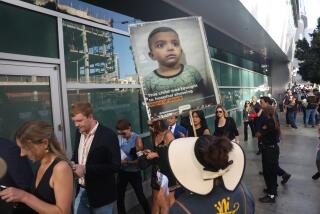On a TV Near You: Protest Without End
When people think about the cradle of a revolution, they tend to imagine either a cabal of exiles (Vladimir I. Lenin plotting in Switzerland) or a group of ordinary citizens hurling off a tyrant’s yoke (the American colonies in 1776). It is hard to know how history will treat the Convergence Center, headquarters for the protesters during the Los Angeles Democratic National Convention. A chaotic, unruly and generally cheerful affair, it boasted a lot of young, white people in need of a bath. Even appeals for order had to be cloaked in humor. As one banner pleaded: “Hierarchy is illogical: the revolution must be Vulcanized.”
The idea that the same people who closed down the World Trade Organization barely a year ago in Seattle are now reduced to calling on Spock for guidance would seem to indicate a lost cause. In both Philadelphia and Los Angeles, the protests were far less disruptive than many people had feared; the attempt to shut down the spring meeting of the International Monetary Fund in Washington was something of a dead-cat bounce. Rage Against the Machine may have been the name of the band at Monday’s riot; tantrum against the machine seemed more appropriate.
Is what once seemed like a revolt against global capitalism nothing more than a passing fad? Can the fat cats of Wall Street and Silicon Valley sleep happily, knowing that the youth of America have once again refocused their minds on Britney Spears’ midriff, rather than any of that social-justice stuff? The answer is more complicated than you might expect.
In retrospect, two things now seem obvious about Seattle. The first is that policing matters. In Seattle, the police were underprepared and undermanned. They ceded control of the city. At all the meetings since, protesters have been heavily outnumbered--not just out-fought but out-thought. In both Philadelphia during the Republican National Convention and Washington, the police made preemptive raids on the protesters’ headquarters; in Los Angeles, the mere threat of this added to the chaos, because protesters had to hide their banners and puppets at various points around the city.
The second point is that the coalition that came together in Seattle was extremely fragile, if not contradictory. The alleged evils of world trade gathered together older union workers, environmentalists, nongovernmental organizations, churches, a few right-wing America-first types, anarchists and students. The unions played little role in the protests in Washington and Philadelphia; in Los Angeles, they actually accounted for roughly one in three of the Democrat conventioneers. The NGOs were also only occasionally visible in Los Angeles.
Though the core group of protesters seems to have shrunk, their message has, paradoxically, grown more unfocused. In Seattle and Washington, the enemy was clearly global capitalism. In Los Angeles and Philadelphia, many people seemed more upset by the death penalty and police brutality. One group in Philadelphia dressed as goats. Asked to explain their garb, several goats professed ignorance. Eventually, the answer came: “Goats are famous for eating, like, anything. So you see it is a metaphor for politics.”
Hardly revolutionary material. But the temptation to write off the protests as a temporary blip is wrong, and not just for the obvious reason that the goats and their allies will be back on your TV screens during the IMF-World Bank meeting in Prague this fall. (Clever move by the way: siting the meeting in the hippie capital of Europe.) The anti-global movement is not going away; from some angles, it is actually winning.
Begin with the fact that, even though the police managed to outmaneuver protesters, they did so only with an enormous display of force and a fantastic disruption of life for everyone else. Any Angeleno who fell into a temporary coma before Seattle and then woke up last week would have been astounded by the images on television. Meanwhile, driving around downtown Los Angeles during the convention was a bit like entering a Third World city in the middle of a coup: screeching sirens, roadblocks and jackbooted cops clutching tear-gas canisters and knocking down cameramen.
Next, the anti-global movement is a worldwide affair. There have been violent protests this year in other cities, including London (where rioters daubed Winston Churchill’s statue with paint, sending colonels across the home counties into apoplexy) and Zurich (which prompted the oxymoronic headline “Swiss youth protests”). In France, a crowd of 40,000 gathered for the trial of Jose Bove, the farmer who drove his tractor into a McDonald’s.
Bove attracted sympathetic comments from French Prime Minister Lionel Jospin, who explained that he “was not very pro-McD.” Anti-globalization--or anti-Americanization, as they would prefer to see it--is close to an official religion in many parts of continental Europe and Asia. Even in the United States, eight years into the longest boom in the country’s history, polls show barely a majority of the population favors globalization.
Frightened, the pro-globalists have changed their language: Using the word “globalization” is now discouraged at the IMF. Rather than talking about free trade, governments now prefer to talk about “trade partnerships.”
Nor is this just a matter of language: Protesters have already changed the agenda. The World Trade Organization has barely recovered since Seattle; there is no sign of a new trade round. It is hard to imagine Congress accepting any new trade agreements without strenuous environmental and workers-rights provisions of the sort that enrage countries in the Third World. Agriculture and intellectual property also remain intractable issues.
Above all, there is the question of sentiment. Whatever they felt about their methods, most of the people in Staples Center probably agreed with the protesters’ basic sentiments: that capitalism is out of control; that too many of the rewards seem to go to too few people; that the balance of power has shifted dangerously from labor to capital; and that something has to be done to reduce people’s anxiety about losing their jobs.
Globalization has not only made most of us richer materially over the past few decades. It has made us richer culturally, too, expanding our horizons and promoting the creative mixing and matching of different cultural traditions. But these benefits have been brought at a cost: Globalization’s relentless drive for efficiency is exhausting and disorienting.
From this perspective, protesters do not have to close down conventions to win. They merely have to tap into our deepest fears about a world run out of control. That they are doing pretty well, even without the help of Spock. *
More to Read
Get the L.A. Times Politics newsletter
Deeply reported insights into legislation, politics and policy from Sacramento, Washington and beyond. In your inbox three times per week.
You may occasionally receive promotional content from the Los Angeles Times.










